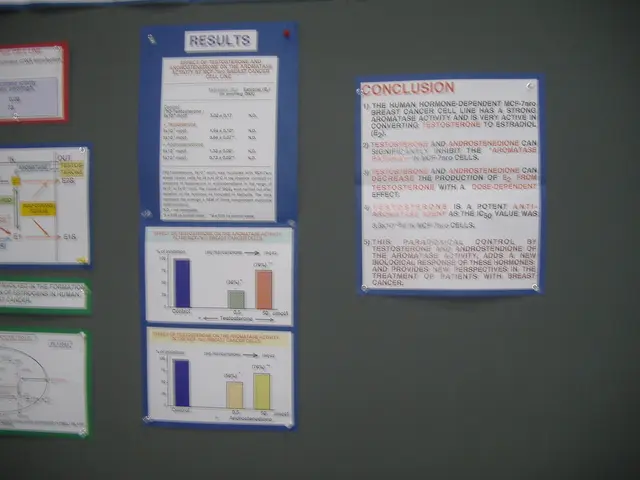Understanding Peptic Ulcers: Their Definition and Essence
Peptic ulcers are sores that develop on the lining of the stomach, small intestine, or esophagus. If you're experiencing symptoms such as severe abdominal pain, nausea, loss of appetite, weight loss, indigestion, vomiting blood, or passing black, tarry stools, it's crucial to seek medical attention immediately.
A peptic ulcer is often caused by a reduction in the protective mucus layer, allowing stomach acid to erode the lining. Antacids can provide quick relief by neutralizing stomach acid, but they do not promote healing. For healing, medications such as Proton Pump Inhibitors (PPIs) like omeprazole and lansoprazole, which significantly reduce stomach acid production, are more effective.
If an ulcer is caused by an infection, antibiotics like amoxicillin or clarithromycin may be prescribed to eradicate Helicobacter pylori (H. pylori). Maintaining a healthy diet, with regular meals, fiber-rich foods, and limiting processed foods, can help prevent the development of peptic ulcers. Avoiding trigger foods, such as spicy foods, caffeine, and alcohol, can help manage symptoms.
Managing stress through relaxation techniques can also help reduce the risk of peptic ulcer symptoms and aid in healing. Regular exercise can help relieve stress and improve overall health, while quitting smoking can help the stomach heal and reduce the risk of ulcer recurrence.
A specialist in gastroenterology is the appropriate doctor for diagnosing and treating peptic ulcers. Diagnosis typically involves a combination of medical history, physical examination, and tests such as endoscopy, barium swallow, or tests for Helicobacter pylori infection.
Complications of peptic ulcers can be severe. Perforation, where an ulcer creates a hole in the wall of the stomach or duodenum, leading to the leakage of digestive juices into the abdominal cavity, is a medical emergency. Untreated ulcers can lead to peritonitis, an infection of the abdominal cavity, which can be life-threatening. Gastric outlet obstruction, due to swelling and scarring from an ulcer, blocking the passage of food from the stomach to the small intestine, can cause severe vomiting and weight loss.
Regular health check-ups can help monitor digestive health and catch any potential issues early. Treatment for peptic ulcers may include medications, lifestyle changes, and, in severe cases, surgery. If you suspect you have a peptic ulcer, seek medical attention promptly to ensure proper diagnosis and treatment.
Read also:
- Trump's SNAP reductions and New York City Council's grocery delivery legislation: Problems for city residents highlighted
- Reducing dental expenses for elderlies in Sweden: Over 50% cut in charges for pensioners by the government
- Forty-year-old diet: A list of meal choices to savor
- Exiled Life's Conundrum: A Blend of Liberation, Disillusionment, and Distress







